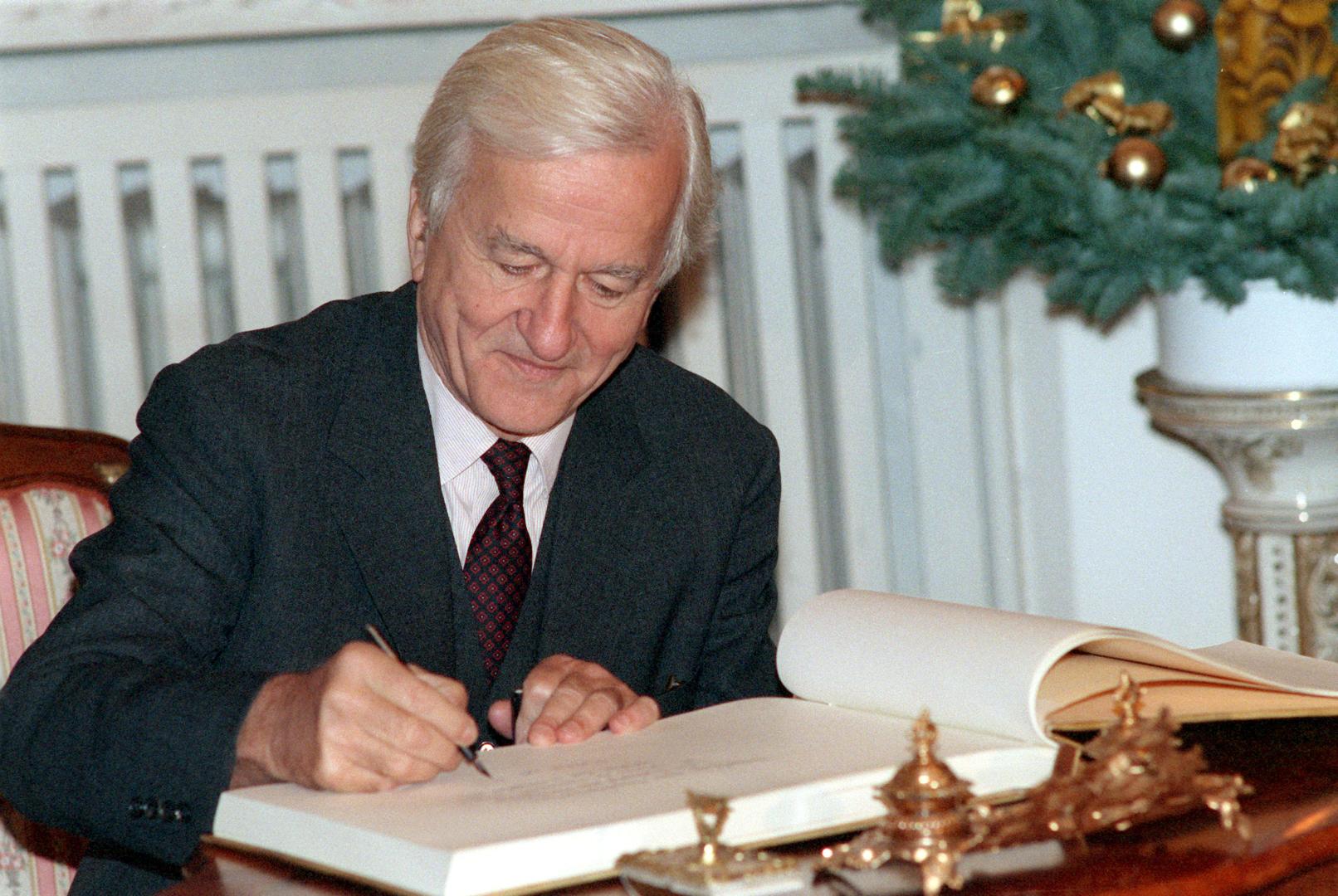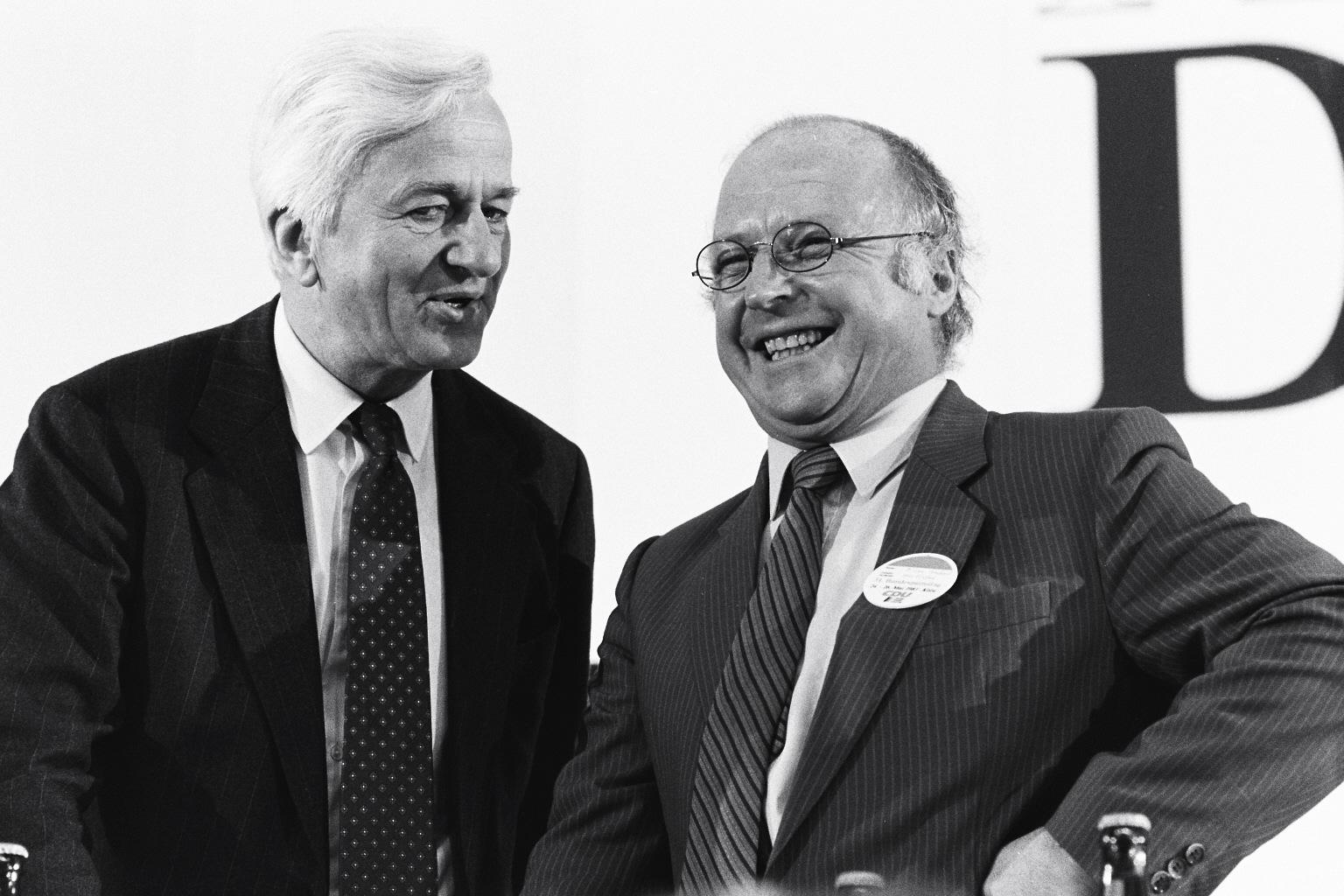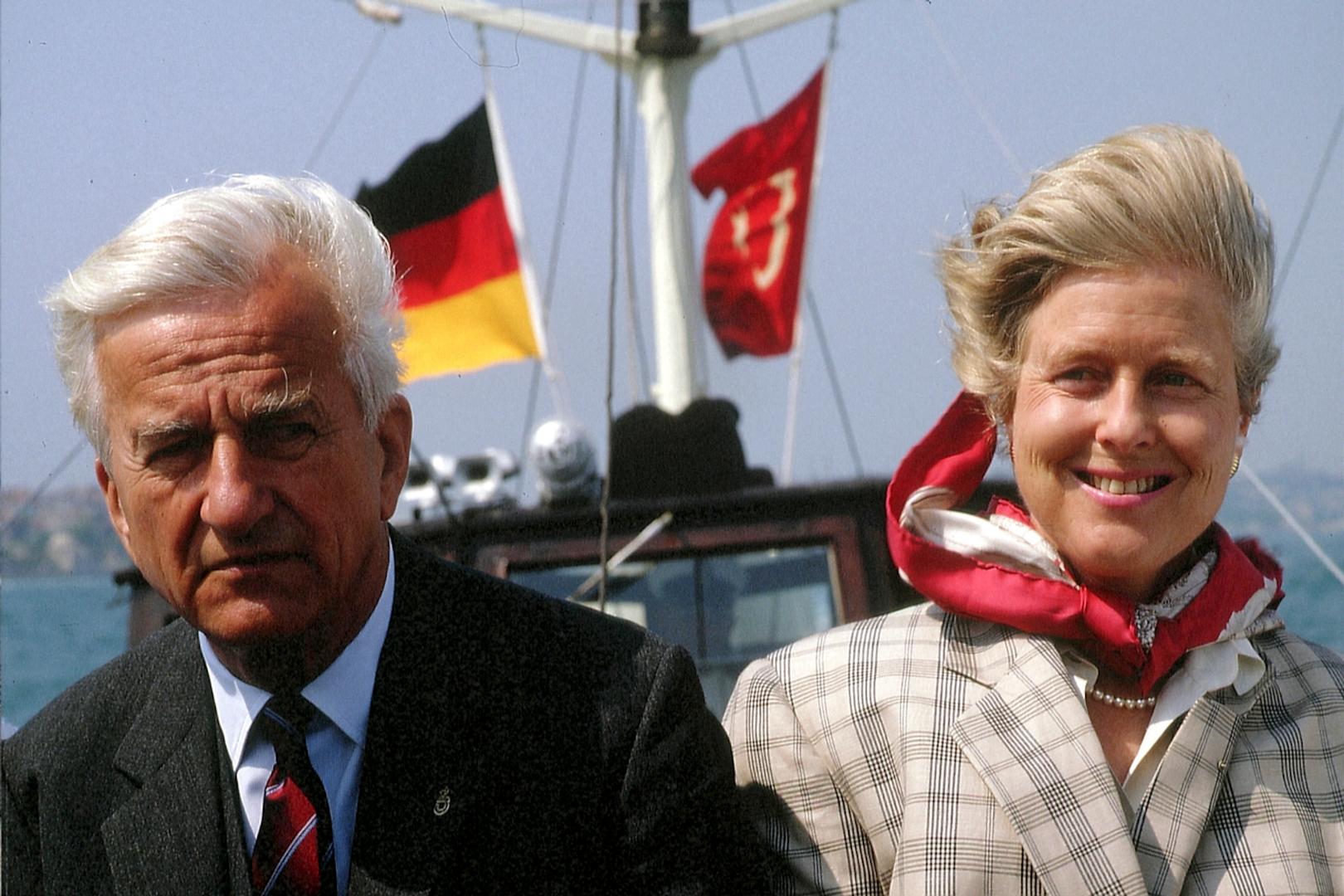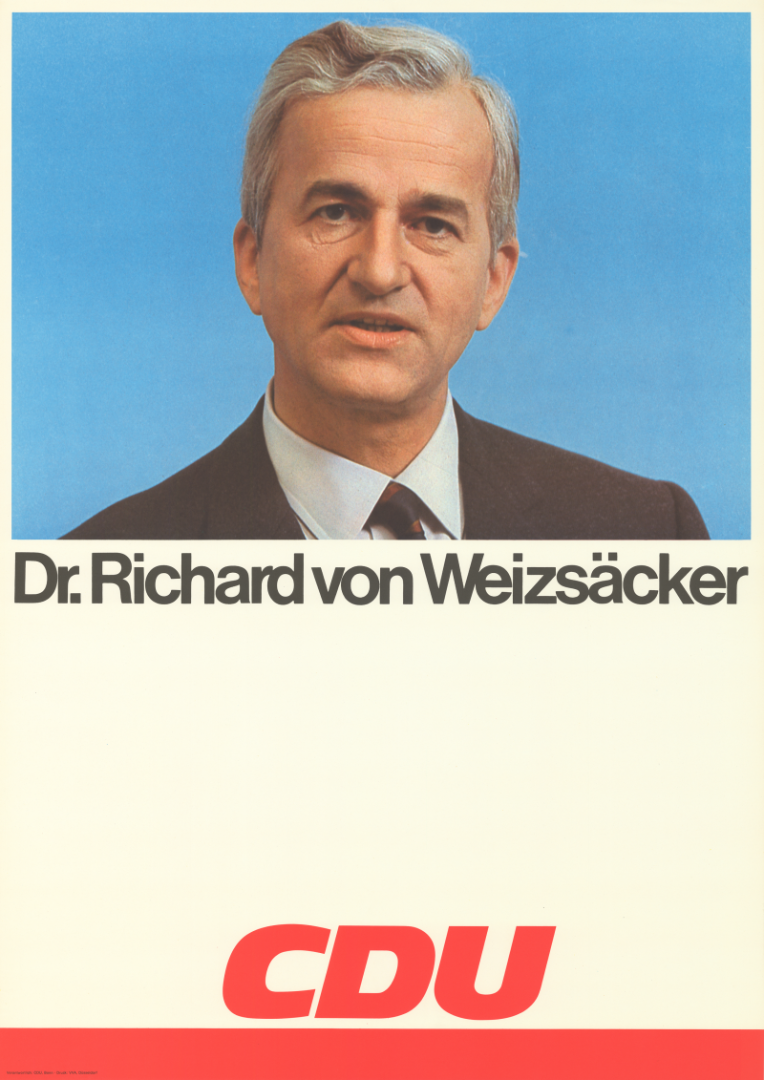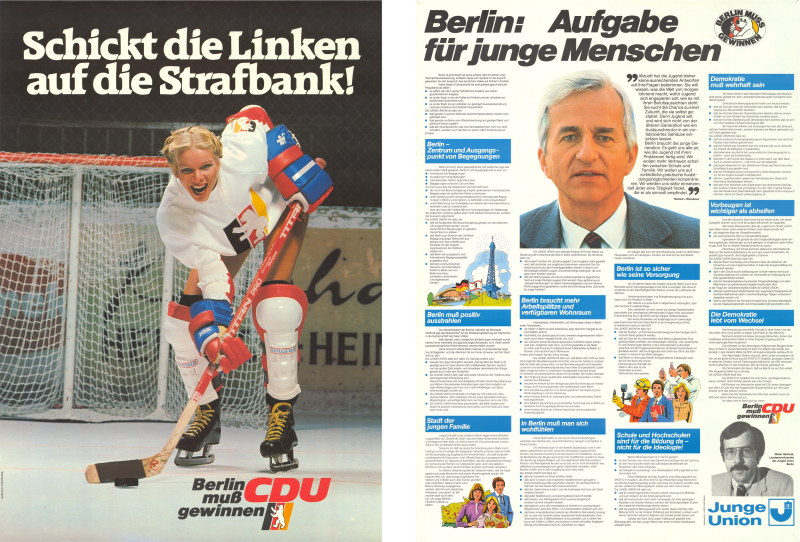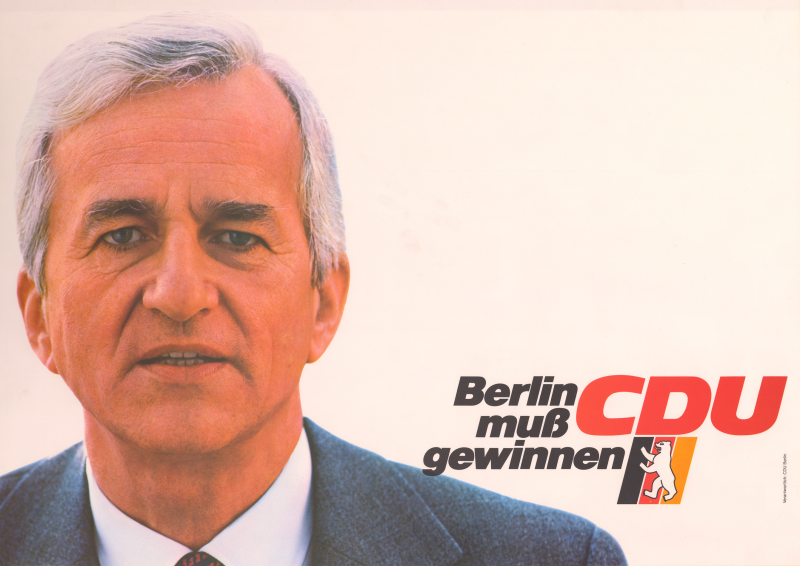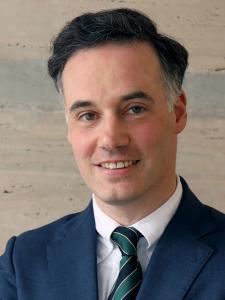Overview – Skip to a certain paragraph:
☛ The "Ideal Liberal Conservative"
☛ Background, Training and Career
☛ Protestant Background and Political Activities
☛ Raising the Liberal-Conservative Profile of the CDU
The "Ideal Liberal Conservative"
"It must be said that among the political personnel of a very prosaic Federal Republic, he is the one who best retains the aura and the charisma of the 'Germany' of former days." This appraisal of Richard von Weizsäcker was given in Retour à Berlin, a journal written by Brigitte Sauzay, who served as an interpreter to the French presidents Georges Pompidou, Valéry Giscard d’Estaing and François Mitterrand. The "Germany of former days"? It is not immediately clear to German readers what is meant by that phrase. The author, a Frenchwoman and an expert on Germany, was addressing, first and foremost, people like herself: Germanophile French people who see in Germany not just the success of the Federal Republic, but also a nation of culture that has always fascinated them. And this nation has a political history. For Sauzay, the "Germany of former days" is the Germany of the late nineteenth and early twentieth century, the tradition of which was severed in 1933 when Hitler came to power.
The French political philosopher Raymond Aron once said of this Germany that it was even more of a "pioneer country" than Great Britain. In a conversation with the American historian Fritz Stern, he even declared that the twentieth century could have been "Germany's century". National Socialism and the Second World War, however, led to a rupture that could no longer be mended. For Brigitte Sauzay, Weizsäcker represented a link back to this Germany by virtue of his identity and mode of thought. She articulated this viewpoint upon the publication of his memoir Vier Zeiten (From Weimar to the Wall: My Life in German Politics) and, with regard to that mysterious "Germany of former days", added: "It is a great pleasure to find it again in his writing".
Although that is a very French perspective, many German contemporaries are likely to have understood instinctively what Sauzay meant. Weizsäcker always had something about him that serenely broke through the confines of any given situation. It is evident in pictures from the early days of his political career in the Bundestag: his presence could fill a room without stifling others. His manner, dress and body language reveal a man who is completely invested in the business of politics, but would be equally at home in another field. Of the two terms used by Sauzay in her book, the word 'aura' more aptly describes this bearing that seems to transcend the immediate circumstances. 'Charisma', in the sociological or generally understood sense of exerting exceptional power, was definitely not a trait that Weizsäcker possessed.
Indeed, he almost never had much political power during his career as a politician – a vocation he embarked on relatively late in life. When first elected to the Bundestag in 1969, he was part of the opposition; he served as governing mayor of Berlin for slightly less than three years, from 1981 to 1984; and as federal president from 1984 to 1994, he was essentially a figurehead. At all times, however, and not just when he took up the office of federal president, he benefited from what Sauzay calls aura: a certain presence that, even without actual power, conveys authority and compels respect. Naturally, this did not make him universally popular. It is also true that Weizsäcker could make those he interacted with quite aware that he had this aura. To put it another way, one could say that, like Helmut Schmidt, who was a friend of his in later years, he was certainly not averse to showing his intellectual superiority.
Background, Training and Career
That speaks for a level of self-assurance that does not come about all by itself. Richard von Weizsäcker was the scion of an educated middle-class family from Württemberg. The Weizsäckers’ rise to prominence began in the late eighteenth century, when they were still millers, and reached its zenith in 1906, when Weizsäcker's grandfather, Karl Hugo, became president of the Staatsministerium in the Kingdom of Württemberg, a position that corresponds to the office of minister president today. Consequently, his family was raised to the nobility, and in 1916 – only two years before the abolition of the monarchy and all royal and noble ranks – Karl Hugo von Weizsäcker was granted the hereditary title of Baron. Richard von Weizsäcker was born on 15 April 1920 in the New Palace in Stuttgart, making him the first member of the family to bear the title from birth.
Weizsäcker's father was the diplomat Ernst von Weizsäcker, who was a Staatssekretär (State Secretary) in the Foreign Ministry from 1938 to 1943 and who, although he rejected Nazism in private, was involved in the genocide of European Jews as a result of the office that he held. On 14 April 1949, in the Wilhelmstrasse Trial, Ernst von Weizsäcker was convicted as a result of his bureaucratic participation in the Holocaust and was sentenced to five years in prison, of which he served only eighteen months. Richard von Weizsäcker, who stood by his father as an assistant defence counsel during the trial – he himself was still a law student in Göttingen and not yet a solicitor – always maintained that the verdict was "historically and morally unjust".
A historian must consider the case of Ernst von Weizsäcker with the requisite appreciation of the complexities involved. Ernst von Weizsäcker cannot be said to have been a Nazi; nor is it possible, however, to overlook his involvement in the crimes of the National Socialist regime. For Richard von Weizsäcker, matters were simpler: he was concerned with defending his father and his family, and he closed his eyes to the rest. At the same time – and this is what constitutes the ambivalence that clung to Richard von Weizsäcker ever afterwards – he drew some crucial historical lessons from this trial. The Nuremberg trials reinforced in Weizsäcker a consciousness that he had gained in the Second World War as an officer on the Eastern Front. During that time, when he had maintained contacts to the military resistance against Hitler, he had developed an awareness of German guilt and the responsibility to bear it in memory.
This consciousness culminated in the speech that he delivered as federal president on 8 May 1985 regarding the surrender of the 'Third Reich' in the West, an address that became famous. The observations that Weizsäcker made in this speech were not new, but never before had a high-level representative of the state – let alone the highest – stated them so clearly. It was especially significant that he referred to 8 May 1945 as a "day of liberation". At this point, Weizsäcker had been federal president for almost a year. Only in this office was he entirely at ease with himself. In retrospect, his entire political career leading up to his election as federal president seems like preparation for the highest office of the Federal Republic.
Admittedly, his political career had got off to a late start. After studying law and earning his doctorate at the University of Göttingen, Weizsäcker did not manage to join the civil service as a judge – a turn of events for which he bore some responsibility. Nor was he interested in a scientific career, which would have been in line with family tradition and was the path chosen by his brother, the physicist Carl Friedrich von Weizsäcker, eight years his elder. Instead, he began working for the mining division of Mannesmann AG in Gelsenkirchen, making him the first member of the Weizsäcker family to take a job in the private sector. It was there that he met Marianne von Kretschmann, soon to be his wife, with whom he would have four children. Weizsäcker worked in industry for fifteen years, ultimately serving on the board of directors of C.H. Boehringer Sohn, a pharmaceuticals company. In 1966, he left his position there and set up a law practice in Bonn.
Protestant Background and Political Activities
Richard von Weizsäcker was not involved in party politics during this time. Although he had joined the CDU in 1954, he did not become active in the party. One thing that appealed to him about the CDU was the idea of the union between Christians of both the Protestant and Catholic denominations as well as the combination of liberal, conservative and social elements. He had reservations about the C in the party's name, however, because he considered the standard that it implied all but unattainable in practice and believed that Christianity should properly serve as an inspiration in politics and not as a concrete guideline for action. If he viewed himself as a decidedly political Protestant, then only in the sense of a Protestant-inspired ethic of responsibility that compels Christians to service on behalf of state and society, but which does not prescribe specific conduct for them.
This is also how he viewed the office of president of the German Protestant Church Assembly, which he held from 1964 to 1970 and then again from 1979 to 1981. The Protestant influence – or perhaps better, 'cultural Protestant' influence – did, in fact, play a key role for Weizsäcker. In contrast to Helmut Kohl, it would not have occurred to him to refer to the CDU as his 'political home'. If he had something like a political home, then it was Protestantism in the sense described above. Nevertheless, it was Kohl who brought Weizsäcker into politics in 1969 by helping him obtain a seat in the Bundestag. Weizsäcker was one of a group of newcomers who came from outside the traditional structures and with whose help Kohl wanted to modernize the CDU. Back in the spring of 1965, when Kohl first made contact with Weizsäcker, he was also interested in having a prominent, politically-active Protestant for the Rhineland-Palatinate CDU and, in Weizsäcker, he found one who even had an illustrious name. Weizsäcker was still working at the Boehringer pharmaceuticals company at the time and was not yet ready to enter politics. He preferred to dedicate his free time and energy fully to his honorary duties as Church assembly president. Kohl and Weizsäcker, who agreed on many things, parted with the firm intention of trying again at a later date.
Only a year later, in 1966, Weizsäcker was elected to the national board of the CDU at Kohl's suggestion. A Church assembly president was a good fit for committees like this. Although it then took two more years before Weizsäcker was ready to fight his first election, this election was quite a special one. In the summer of 1968, the general secretary of the federal CDU, Bruno Heck, with Kohl’s express support, asked him to stand against Gustav Heinemann for the office of federal president, in the election to be held in the Federal Assembly in March of the following year. Weizsäcker ultimately agreed to stand for the office. However, the party chairmen and the parliamentary group executive committee of the CDU and CSU voted by a majority to select as their candidate the serving defence minister, Gerhard Schröder, who had been proposed by Franz Josef Strauß and Hans Filbinger.
Member of the Bundestag
In 1969, Richard von Weizsäcker was finally persuaded to stand for parliament by the CDU and entered the Bundestag via the state party list for Rhineland-Palatinate. Within the CDU/CSU parliamentary group, of which he was elected deputy chairman in 1972, he quickly made his mark as a brilliant speaker and foreign policy specialist. In debates on the Ostpolitik of the SPD/FDP coalition government, he adopted a position between that of the government and the hard-liners in his own parliamentary group. This reflected the convictions he had acquired as president of the German Protestant Church Assembly, when he had been involved in formulating the Ostdenkschrift (memorandum on East Europe) of the Evangelical Church in Germany (EKD). Although he remained fully committed to Germany’s alignment with the West, as achieved by Konrad Adenauer, the change in policy of the Western allies toward the Soviet Union convinced him that it was now necessary for the Federal Republic to take the improvement of relations with the Warsaw Pact countries, especially Poland, into its own hands. This in turn brought an end to the position that ethnic Germans who had been expelled from other countries following the Second World War should one day be permitted to return to their old homes.
In the end, Weizsäcker was one of only three members of the CDU/CSU parliamentary group who agreed to the ratification of the treaties with the Eastern bloc in 1972 – for the sake of good sense, he said, because a failure of the painstakingly negotiated treaties in the Bundestag would have isolated Germany among its own allies in a way contrary to its interests. It would not be correct to view this stance as reflecting any agreement, in principle, with the new Ostpolitik. In fact, Weizsäcker was very sceptical of it. For him, Egon Bahr's formula of "change through rapprochement" was more likely to cement the division of Germany. During these years as a member of the Bundestag, the things he said and did were informed by an outlook that was both transatlantic and based on the interests of Germany as a whole, on both sides of the border – it was the point of view of the now westernised "Germany of former days", if you will. In addition to the need to reconcile with its neighbours, all of the country’s efforts, in his view, had to be aimed at restoring the unity of the nation within the Western political and economic sphere, even if that required renouncing its claim to former territory in the East.
Weizsäcker was worried by the SPD’s increasing shift to the left and frustrated by the devaluation of the concept of 'nation' in the ranks of the governing coalition. On 24 February 1972, he addressed this issue in the Bundestag as follows: "In my view, nation is the quintessence of a shared past and future, of language and culture, of consciousness and will, of government and territory. With all its flaws, with all its errors arising from the spirit of the times, and yet with a common will and consciousness, this nation of ours was given its stamp in the year 1871. ... It has not yet been replaced by anything else. Unfortunately, during the anniversary year of the founding of the Empire – last year, in other words – we instead heard mostly critical comments regarding this nation from the upper levels of the government, even some of the highest".
Raising the Liberal-Conservative Profile of the CDU
Just as Richard von Weizsäcker refined and defended the concept of 'nation' in debates involving the new Ostpolitik, he also argued, within the CDU, for a vision of the party as a conservative force. Indeed, the formulation of party objectives was the second major field in which he made his mark during his time in the Bundestag. In December 1971, at the request of the federal CDU chairman, Rainer Barzel, he headed a seven-member policy commission whose work ultimately led, although this had not been the original intention, to the adoption of a new political programme at the 1978 party conference in Ludwigshafen. During these years, the views that Weizsäcker expounded in every field of policy clearly demonstrate his adherence to conservative values, not least in the area of family policies. But in referring, privately or publicly, to the value of conservatism, he was primarily referring to a conservative mindset.
In February 1971, writing in the Süddeutsche Zeitung, he presented his understanding of conservatism within a liberal system, after the British model. In this article, he criticized Chancellor Willy Brandt for accusing politicians "who persist in mostly conservative thinking" of being incapable of reform, and added: "My counter-thesis is that good reformers are those who succeed in winning over conservatives for their changes. But the only good conservative party is the one that implements the necessary reforms itself". Conservation and reform went hand in hand for Weizsäcker. This was so important to him that he repeated it almost word-for-word in his memoirs later on. There, he refers to Benjamin Disraeli in this context, as do many in German-speaking lands, although Edmund Burke, George Canning and Sir Robert Peel are much more important sources for this type of liberal conservatism.
In any event, when he attended the national CDU party conference that was held in Hamburg in 1973, he left no doubt that, in addition to the Austrian People's Party with "its exemplary political programme", he primarily viewed the "English conservatives" as a model, a "party [...] that was truly progressive in the best sense". At the same party conference, he simultaneously argued for "verantwortete Freiheit" (freedom with responsibility) – a concept which, not coincidentally, called to mind the "manly, moral, regulated liberty" that Burke wrote of in his Reflections on the Revolution in France. As Weizsäcker explained: "Freedom means not only individualism, but also the practice of neighbourliness; not only the ability to exchange criticism, but also the ability to trust; not only emancipation, but also attachment; and not only ideological pluralism, but also respect for the system of moral values that serves as the foundation of society". During this period of the 1970s, he was clearly already working on the liberal-conservative image that would characterise his presidency.
Governing Mayor of Berlin
Before that time came, however, Richard von Weizsäcker took the opportunity to stand for a different position and assume what would be his first executive office. In 1978, the West Berlin branch of the CDU offered him the chance to run as a candidate for the office of governing mayor of Berlin. He accepted the offer all the more readily, since he considered Berlin to be his true home. As the son of a diplomat, he had moved home frequently during his youth, but he had spent formative years in Berlin.
In the state election of 1979, the CDU was defeated by the SPD, but when a new state election was called in 1981, it achieved 48 percent of the vote – nearly ten percent more than the SPD. This allowed Weizsäcker to form a minority government in the Berlin Senate. Later, he was able to form a coalition with the FDP after that party switched coalition partners at the national level in 1982. In his new position as Berlin’s mayor, he showed that he was capable of finding the proper balance among a wide variety of competing interests and, more than anything, of effectively bringing to bear the full breadth of the CDU as a mainstream political party.
Federal President
The popularity that he had quickly achieved as mayor did not hinder Richard von Weizsäcker from trying for the office of federal president in 1984. In 1974, he had stood for the CDU/CSU against Walter Scheel, fully aware that he was merely a token candidate. This made it all the more important for Weizsäcker – a highly ambitious man – finally to grasp a genuine opportunity. Despite a certain amount of resistance within his own party, he won acceptance for his candidacy and emerged as the winner in the Federal Assembly. Standing against the Green candidate, author Luise Rinser, he won 80 percent of the votes cast. In view of this result, it was not surprising that Weizsäcker was especially careful to heed his duty of non-partisanship, which is inherent in the office of Federal President anyway. Although he was non-partisan, he was not politically neutral. His criticism of the "power hungriness" of the parties, for example, which he levelled during his second term and after leaving office, met with approval but also caused irritation, even in the ranks of his own party.
As federal president, he continued to address the issues that had occupied him previously. He focused on reconciling with Poland, strengthening the ties of the Federal Republic within Europe and the transatlantic community, and promoting social cohesion in the spirit of "freedom with responsibility". He thereby reinforced his reputation as an "ideal liberal conservative", as the aforementioned Fritz Stern described him in an interview two years after his death. Weizsäcker's strength lay above all in his ability to convey political thought in refined rhetoric. During this first term of office, he acquired such a good reputation that, in May 1989, he ran for re-election unopposed. His lack of rivals can also be explained by the fact that he was precisely what politically-minded citizens thought a head of state should look like. Marion Gräfin Dönhoff, publisher of Die Zeit, once wrote: "If you could synthetically manufacture an ideal federal president, you'd end up with none other than Richard von Weizsäcker".
After the reunification of Germany, Weizsäcker succeeded in winning over East Germans as president. In keeping with his long-held understanding of the German nation as a people not restricted to the former West Germany, he moved the official presidential residence from Bonn to Berlin in January 1994, just a few years after reunification. From the very beginning, in 1990, he urged Germans to reflect that unifying would also mean sharing.
Weizsäcker's image as president can be described as simultaneously patriotic and cosmopolitan, aristocratic and bourgeois, Anglophile and, in the best sense, Prussian. An admirer of Frederick the Great, he consistently promoted tolerance, common bonds, compromise and reconciliation. This applied to German history, too. In his speech of 8 May 1985, and more generally, he succeeded in pointing out the ruptures of German history without concealing the continuities. The Federal Republic established according to the Grundgesetz was the result of a long history that could not be ignored. By the time he died on 31 January 2015 in Berlin, Weizsäcker had reconciled the Germans with this history insofar as that is possible, yet did so without releasing them from responsibility for the crimes of the 'Third Reich'. That is no small achievement. His popularity ratings during and after the presidency show that the Germans repaid him with gratitude.
The original german text was translated by Richard Toovey.
Curriculum vitae
- 1937 Finishes secondary education
- 1937–38 Attends university in Oxford and Grenoble
- 1938–1945 Military service
- 1945–1949 Studies law and history in Göttingen
- 1954 Joins the CDU
- 1964–1970 and 1979–1981 President of the German Evangelical Church Assembly
- 1967–1984 Member of the Synod and Council of the Evangelical Church in Germany
- 1969–1981 Member of the Bundestag
- 1981–1984 Governing Mayor of Berlin
- 1984–1994 President of the Federal Republic of Germany
- 1994–2014 Chairman of the Bergedorf Round Table of the Körber Foundation
- 1994–2015 Chairman of the Board of Trustees of the Theodor Heuss Foundation
- 1999–2000 Head of the Commission on Common Security and the Future of the Bundeswehr
- 2004–2005 German representative on the International Commission on the Balkans



